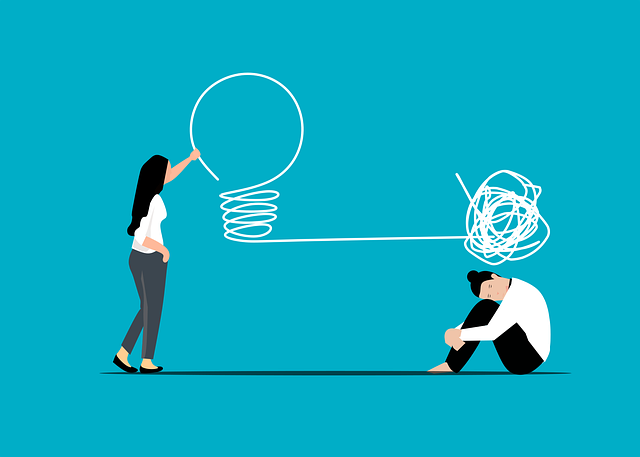Effective group dynamics are key to successful mental wellness facilitation at Arvada Divorce Therapy. Facilitators create an inclusive, supportive environment through clear guidelines, active listening, and structured activities, addressing power imbalances and encouraging open communication. Tailored sessions, icebreakers, and crisis intervention guide members through shared struggles, empowering them with tools for stress management and stigma reduction. Measuring individual growth using standardized assessments helps track progress and personalize interventions. This holistic approach fosters community resilience, mirroring Arvada Divorce Therapy's focus on both individual and collective healing.
In today’s digital era, mental wellness group facilitation plays a crucial role in supporting individuals navigating life transitions, such as those facing Arvada divorce therapy. Effective facilitators understand group dynamics and harness them to create safe, supportive environments. This article delves into proven techniques for guided discussions, activity planning, and measuring individual growth within these groups. By exploring these strategies, professionals can enhance their practices, fostering resilience and healing in their clients.
- Understanding Group Dynamics for Effective Facilitation
- Techniques to Foster a Safe and Supportive Environment
- Strategies for Guided Discussion and Activity Planning
- Measuring and Promoting Individual Growth within the Group
Understanding Group Dynamics for Effective Facilitation

Understanding group dynamics is a cornerstone for effective facilitation, especially within mental wellness settings like Arvada Divorce Therapy. Groups are intricate environments where individuals bring unique personalities, experiences, and emotional states. A skilled facilitator must navigate this complexity, fostering an inclusive atmosphere that encourages open communication. By recognizing power imbalances, managing group energy, and facilitating active participation, facilitators create a safe space for members to share, learn, and support one another.
This process involves strategic interventions, such as setting clear expectations, promoting active listening, and providing crisis intervention guidance when needed. Incorporating self-care practices within these groups is also vital, ensuring that participants and facilitators alike maintain their well-being. Effective facilitation not only enhances the therapeutic experience but also empowers individuals to navigate challenges more effectively, reflecting improved mental wellness outcomes.
Techniques to Foster a Safe and Supportive Environment

Creating a safe and supportive environment is fundamental when facilitating mental wellness groups. It’s crucial to establish guidelines that encourage participants to feel seen, heard, and respected. As a group facilitator, actively listen to each member, validating their experiences and emotions. This simple act can significantly enhance trust and openness within the group. When individuals feel comfortable sharing their stories and challenges, it fosters a sense of belonging and camaraderie, which is essential for effective support.
At an Arvada Divorce Therapy session or similar mental health gathering, incorporating structured activities and icebreakers can help break the ice and promote comfort. Well-designed Mental Health Education Programs can guide these activities, ensuring they align with the group’s goals. By implementing Burnout Prevention Strategies for Healthcare Providers, facilitators can create a nurturing atmosphere where members feel empowered to navigate their mental health journeys together. This supportive environment is key to encouraging honest discussions and providing effective Anxiety Relief.
Strategies for Guided Discussion and Activity Planning

In facilitating mental wellness groups, a structured yet flexible approach to guided discussions and activity planning is key. Starting with an open-ended icebreaker helps create a safe space where members feel comfortable sharing their experiences. This not only fosters a sense of community but also provides insights into common challenges, allowing for more targeted interventions. Following this, structured activities that incorporate techniques like positive thinking, mindfulness exercises, or creative expression can significantly enhance group dynamics.
For instance, incorporating activities aimed at mental illness stigma reduction efforts within the group setting empowers members to challenge stereotypes and promote understanding. Similarly, coping skills development sessions can be tailored to address specific issues faced by participants, whether it’s managing stress, anxiety, or other aspects of mental health. By balancing guided discussions with engaging activities, facilitators at Arvada Divorce Therapy ensure that each meeting leaves participants with practical tools and a renewed sense of hope.
Measuring and Promoting Individual Growth within the Group

Measuring individual growth within a mental wellness group setting is an essential aspect of effective facilitation. As a therapist or group leader, utilizing standardized assessment tools tailored to specific concerns like anxiety and depression can provide quantitative data on each participant’s progress. This practice allows for personalized Crisis Intervention Guidance, enabling facilitators to adapt their techniques and offer targeted support. Regularly tracking these metrics helps in identifying areas where the group dynamic positively influences individuals’ mental health journeys.
Promoting growth further involves fostering a supportive environment through public awareness campaigns development that encourage open communication and peer-to-peer learning. By sharing personal milestones and challenges, members gain perspective and build resilience. This collective experience can be a powerful tool in developing coping strategies and offering mutual support, ultimately enhancing overall well-being, much like Arvada Divorce Therapy focuses on individual and communal healing.
Group facilitation plays a vital role in enhancing mental wellness, as evidenced by effective techniques employed in settings like Arvada Divorce Therapy. By understanding group dynamics, fostering safe spaces, and strategically planning discussions and activities, facilitators can significantly promote individual growth. Measuring progress ensures tailored support, making these techniques essential tools for any mental health professional aiming to revolutionize their practice.














